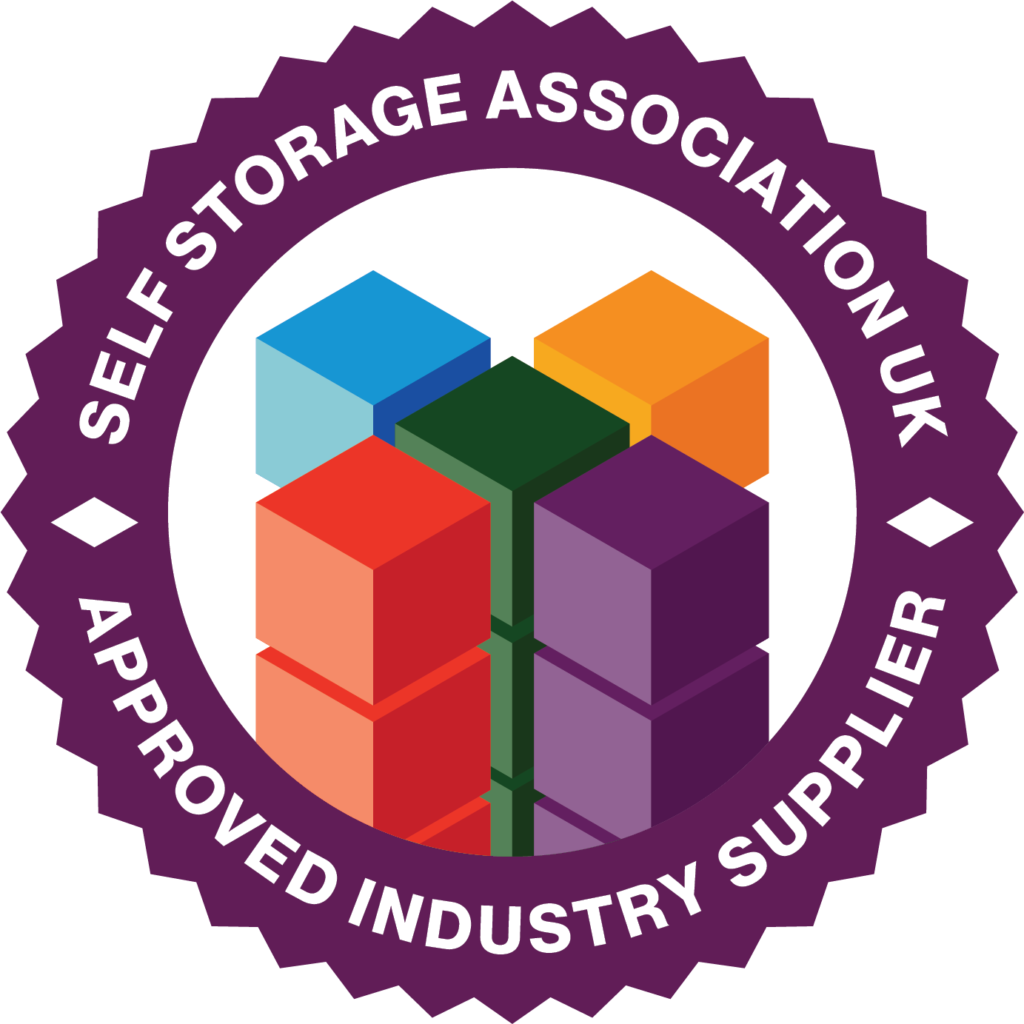Think of an office storage unit as more than just a place to stash old filing cabinets. For businesses across the UK, it’s a smart, strategic move that can totally transform your workspace, making it more dynamic, productive, and a whole lot less cluttered. Getting your space organised is one of the quickest ways to boost efficiency and your team's overall vibe.
Why Your Modern Office Needs Smarter Storage
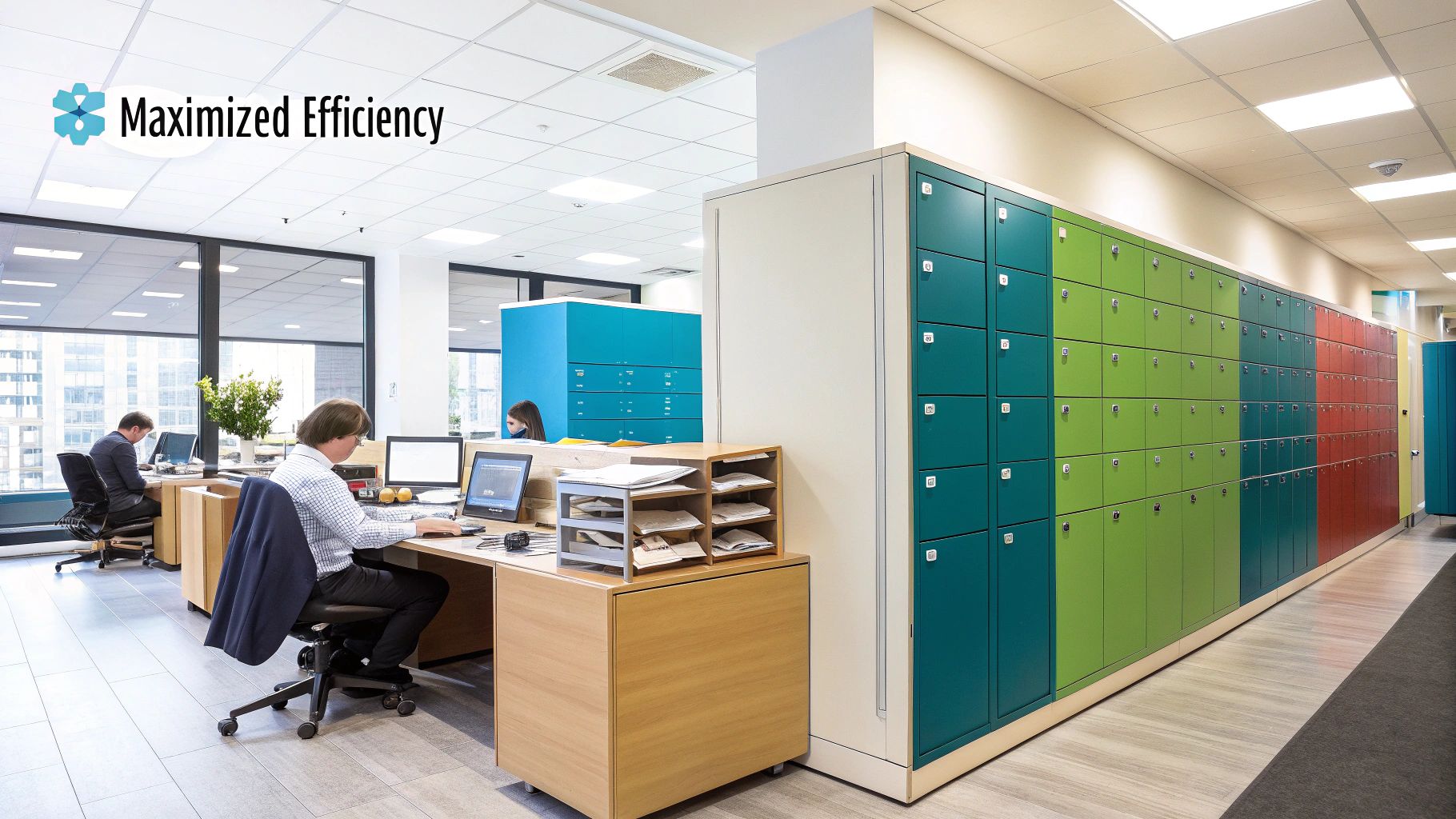
Let's be realistic—the way we use offices has changed for good. With flexible working and agile layouts becoming the norm, every square metre of commercial space counts. Clutter isn't just messy anymore; it's a genuine barrier to getting work done.
Think of your office floor plan as prime real estate. Every bulky cabinet overflowing with rarely-touched documents or seasonal equipment is taking up valuable room. That space could be a new collaboration hub, another desk for a growing team, or simply some breathing room to create a more open, welcoming feel. A disorganised office doesn't just look bad; it can seriously affect your team's focus and morale.
The True Cost of Clutter
The real price of poor storage goes way beyond your monthly rent. It shows up in lost time, with staff hunting for misplaced documents or equipment. It also creates a cramped, stressful atmosphere that nobody enjoys working in. A well-planned storage strategy flips this problem on its head, turning a liability into a real asset.
A dedicated storage unit gives you back your valuable office space, letting you turn cluttered back rooms into productive work zones. It's an investment in a smoother operation and a better working environment for your team.
This approach is especially important in the current UK office market. While demand for high-quality, flexible spaces is on the rise, new construction is actually falling behind. Industry data shows a clear split: older UK office buildings have a vacancy rate of around 15%, but for modern Grade A buildings, it's just 6%. This squeeze makes it crucial for businesses to get the absolute most out of the space they already have, and that’s where external storage becomes an essential part of the plan.
Reimagining Your Workspace
By moving everything that isn't essential for daily work into a secure, off-site unit, you can unlock some fantastic benefits for your business:
- Create a More Dynamic Layout: Free up the floor for hot-desking, breakout areas for brainstorming, or professional client meeting spaces.
- Improve Operational Flow: When only the essentials are kept on-site, day-to-day tasks become much smoother and more organised.
- Enhance Team Morale: A clean, open, and tidy office is simply a more pleasant and motivating place to be.
- Protect Important Assets: Keep sensitive documents, valuable equipment, and surplus stock safely tucked away from the risks of a busy office.
When you look at it this way, storage units for offices become a tool for growth, not just a holding pen for forgotten things. If you're ready to get started, our guide on the 5 essential tips for maximising business storage space is a great place to begin.
Choosing the Right Storage Unit for Your Business
Picking the right storage unit isn't just about finding an empty room; it’s about finding a solution that genuinely fits your business. Get it wrong, and you could be wasting money or, even worse, putting your valuable assets at risk. To make a smart decision, you need to look past a simple list of sizes and really understand what each type of storage offers.
Think of it like choosing a new vehicle for your company. A small, zippy car is perfect for nipping around the city to visit clients, but you’d need a hefty van if you were delivering bulky goods. It’s the same with storage. The unit you need for archiving sensitive legal files is worlds away from what you'd need to store bulky trade show equipment or surplus office furniture during a refurb.
On-Site vs Off-Site Storage Solutions
Your first big decision is whether to keep your extra items on your premises or use a dedicated off-site facility. On-site options, like a modular pod in the car park or a converted spare room, give you instant access. The catch? They eat up valuable floor space and rarely have the kind of security you truly need.
Off-site storage units for offices, on the other hand, offer a secure, purpose-built environment designed specifically to protect business assets. Yes, it means a short trip to get to your things, but the trade-off is significant: top-tier security, professional management, and the ability to use your expensive commercial space for activities that actually make you money. For long-term archiving, managing excess stock, or stowing equipment, it’s almost always the most practical choice.
When thinking about storage, many people first picture the filing cabinets and shelves within their own office.
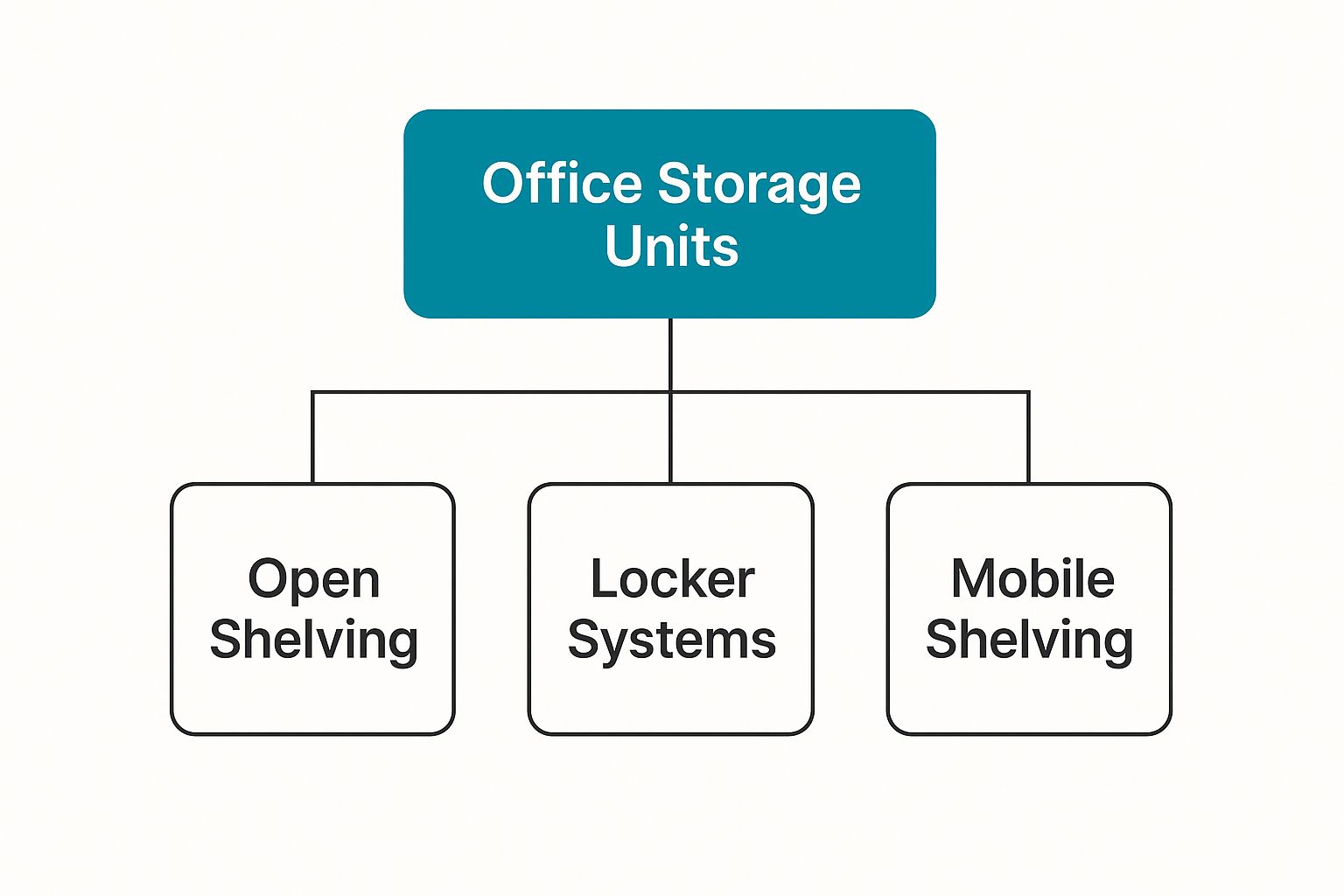
While these systems are great for day-to-day organisation, for anything that's used less often, is bulky, or requires a higher level of security, an external unit is by far the better option.
Comparing Office Storage Unit Types
To help you weigh up your options, it's useful to compare the different kinds of storage available. The table below breaks down the most common types, showing what they're best for and what you need to keep in mind.
| Storage Type | Best For | Key Features | Primary Consideration |
|---|---|---|---|
| In-Office Shelving/Cabinets | Daily-use files, stationery, and immediate supplies. | Instant access, integrated with the workspace. | Consumes valuable office floor space. |
| On-Site Pods or Containers | Temporary storage during renovations or for bulky items. | Convenience of being on your property. | Limited security and exposure to weather. |
| Standard Self Storage Unit | Archiving documents, storing furniture, excess stock. | Cost-effective, secure, various sizes available. | May lack protection from extreme temperatures. |
| Climate-Controlled Unit | Electronics, sensitive documents, wood furniture, fabrics. | Regulated temperature and humidity to prevent damage. | Crucial for valuable or delicate assets. |
Choosing between these really comes down to what you're storing and how much protection it needs. While on-site solutions have their place for immediate needs, a dedicated off-site unit often provides the security and peace of mind that businesses require for their most important assets.
Key Features to Consider for Business Storage
When you start looking at off-site facilities, some features are simply non-negotiable for business use. It’s about more than just space; it’s about the security and flexibility your company needs to operate effectively.
- Climate Control: This is absolutely essential if you're storing anything sensitive. Electronics, wooden furniture, important paper records, and even fabrics can be ruined by swings in temperature and humidity. A climate-controlled unit keeps the environment stable, protecting your assets from mould, mildew, rust, and warping.
- 24/7 Access: Business doesn't always stick to a 9-to-5 schedule. For dynamic teams, event planners, or tradespeople, being able to get to your stock or equipment at any hour is a game-changer. Facilities offering round-the-clock access give you the freedom to run your operations without being held back.
- Robust Security: Look for a facility with multiple layers of security. We're talking high-definition CCTV, secure perimeter fencing, electronic gate access that needs a unique code, and, ideally, individually alarmed units. These measures are fundamental to protecting your inventory, equipment, and confidential archives.
Choosing a storage unit is an act of risk management. The right features, like climate control and individual alarms, aren't just conveniences—they are essential safeguards for your company's physical assets and sensitive information.
For many businesses, the perfect setup is a hybrid one: smart organisation on-site for daily essentials, and a secure off-site unit for everything else. This approach keeps your main workspace clear and productive, while ensuring your long-term assets are kept safe and sound.
To see a range of secure options designed specifically for companies, you can find out more about our dedicated business and commercial storage solutions. Making the right choice from the start ensures your storage works for you, supporting your operations and protecting your investments for years to come.
Getting the Right Size for Your Storage Unit
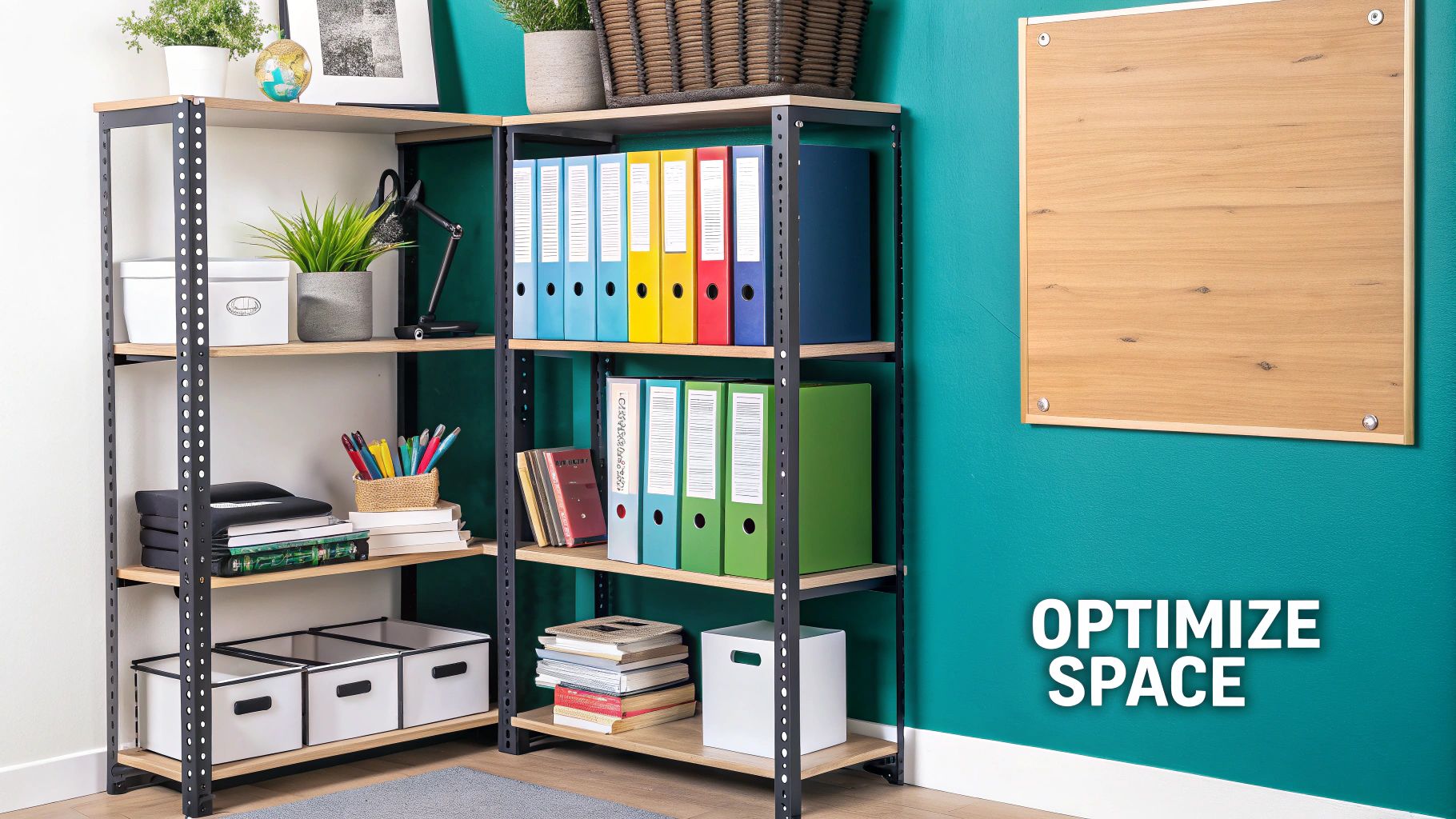
Choosing the right size for your office storage unit is probably one of the most critical decisions you'll make. Pick a unit that’s too big, and you're literally paying for empty air – a completely needless expense for any business. But go too small, and you’re in for endless frustration with a cramped, disorganised mess that completely defeats the point of getting storage in the first place.
Getting it right from the start saves you both money and a world of hassle. It means you have an efficient, organised space that truly works for your business, not against it.
What Do These Sizes Actually Look Like?
It's one thing to read about 'square feet', but it's another thing entirely to visualise it. To help you get a real feel for the space, let's use some everyday analogies.
Think of it like this:
- A 25 sq ft unit is about the size of a classic red telephone box. It’s perfect for stashing around 30-40 archive boxes, a couple of computers, and some marketing materials.
- A 50 sq ft unit feels more like a large walk-in wardrobe. This can easily hold the key contents of a small office – think a desk, chair, filing cabinets, and roughly 80-100 archive boxes.
- A 100 sq ft unit is roughly half the size of a standard single-car garage. It’s a great option for a growing business, giving you plenty of room for bulky items like trade show displays, spare office furniture, and a serious amount of stock or documents.
Using these mental images helps turn abstract numbers into practical, real-world spaces, making it so much easier to gauge what you’ll actually need.
The real aim is to find a unit that fits what you have now, with just a little bit of breathing room for the future. Paying for space you don't use is wasteful, but a cramped unit you can't properly organise is just as bad.
Your Step-by-Step Guide to Taking Inventory
The most reliable way to figure out the right size is to do a proper audit of everything you plan to store. A rough guess is a good start, but a detailed inventory is foolproof.
Just follow this simple checklist to build a complete picture:
- Office Furniture: List every single item, from desks and chairs to filing cabinets, bookshelves, and tables. Don't forget to measure the bigger pieces!
- Archived Documents: Get an accurate count of your archive boxes. A standard box is about 1.5 cubic feet, so you can quickly work out the total space they'll need.
- Electronic Equipment: Tally up all computers, monitors, printers, servers, and other gadgets. These items are often fragile and awkwardly shaped, so remember to factor in the extra room for protective packaging.
- Stock and Inventory: If you’re storing products, count the boxes and estimate their total volume. Crucially, think about how you'll need to access everything – will you need to leave aisles to reach stock at the back?
- Marketing and Event Gear: Don't forget pop-up banners, trade show booths, and boxes of brochures. These are often surprisingly bulky and take up more room than you'd think.
- The Miscellaneous Pile: Finally, make a note of any seasonal decorations, spare office supplies, or anything else that needs a home.
Once you have your complete list, you can use a tool to get a precise recommendation. To get a quick, accurate estimate based on your inventory, give our easy-to-use online storage calculator a try. It takes all the guesswork out of the process.
The Squeeze on Modern Office Space
This need for smart space planning is becoming more important than ever, especially in major hubs like London. The availability of prime office space is shrinking, putting real pressure on businesses to make every square foot count. With a limited supply of new Grade A office space on the horizon post-2025, companies have to find clever ways to manage their footprint.
In this kind of competitive environment, off-site storage units for offices aren't just a nice-to-have; they’re becoming a vital part of running an efficient and lean operation.
What Security Features Should I Look For When Storing Business Assets?
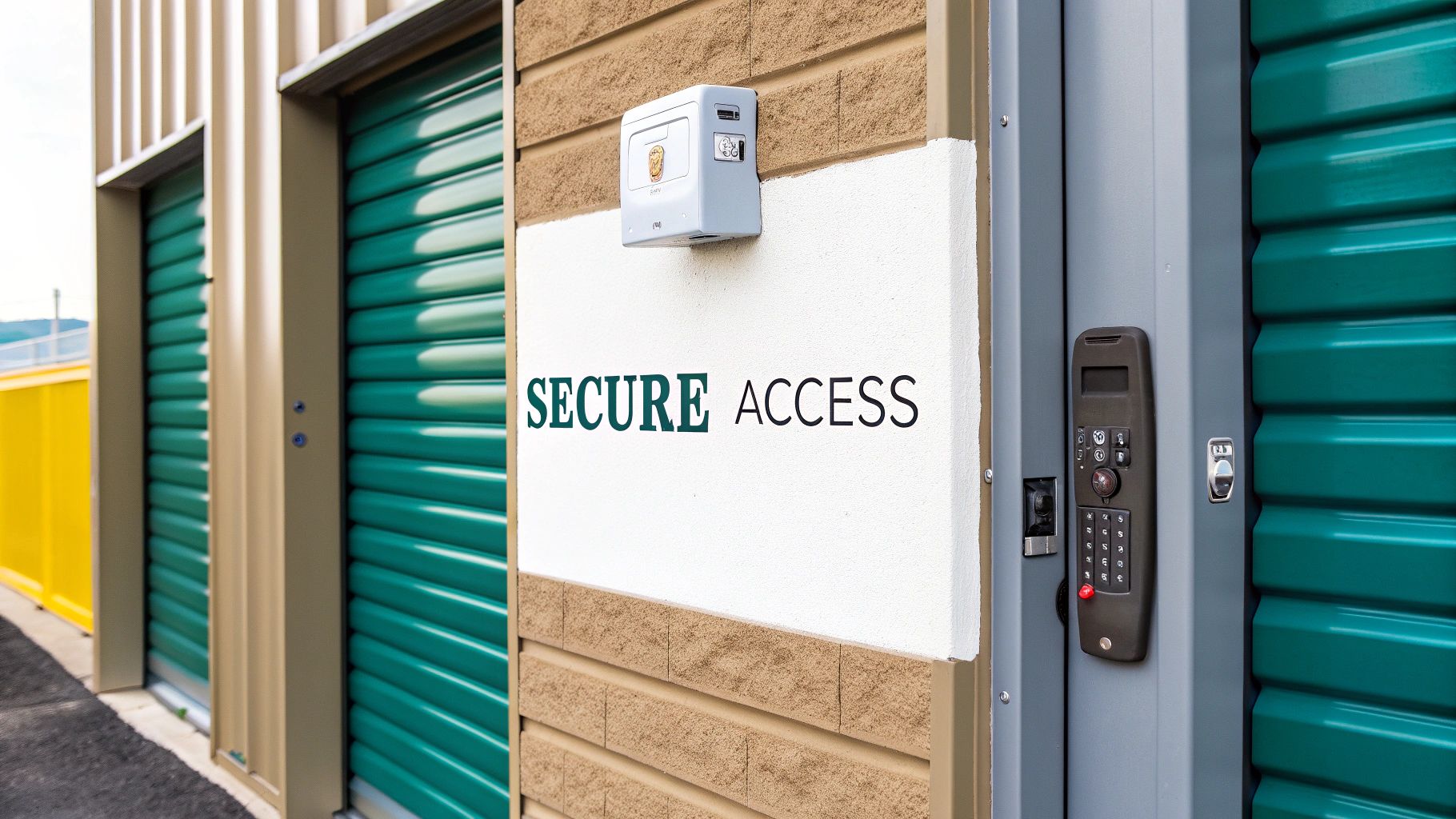
When you're storing business assets off-site, you're not just renting space; you're entrusting a part of your business to someone else. This is why security should be at the very top of your checklist. Choosing storage units for offices is a serious decision, one that's fundamentally about managing risk. The security measures a facility offers aren't just 'nice-to-haves'—they're your primary line of defence for valuable equipment, confidential documents, and essential stock.
It helps to think of security in layers. A simple padlock is just the first, most obvious one. For genuine peace of mind, you need a facility that has invested in a comprehensive, multi-layered system designed to deter, monitor, and tightly control access.
The Foundations of a Secure Facility
Before you even think about the size of the unit, take a hard look at the facility's overall security setup. These are the non-negotiables that protect the entire site, including your belongings.
Start by looking at the perimeter. A high, sturdy fence is the first physical barrier. This should be paired with controlled entry points, like an electronic gate that requires a unique PIN code or a key fob. This isn't just about keeping people out; it creates a digital log of everyone who comes and goes, providing an essential audit trail if something ever goes wrong.
Next, consider the surveillance. High-definition 24/7 CCTV monitoring is an absolute must. Cameras should cover all critical areas: the entrance, exit, all corridors, and the loading bays. It's also worth checking for good lighting throughout the property. Well-lit corridors and external areas get rid of shadows and blind spots, making the whole place feel safer, especially if you need to pop in after dark.
Beyond the Basics: Unit-Level Security
While site-wide security is crucial, the protection for your specific unit is just as important. After all, this is where your most valuable items will live. The best facilities extend their security right down to the individual unit.
This is where features like individually alarmed units make a real difference. If your unit's door is tampered with or opened without the correct code, an alarm is triggered, immediately alerting staff. It’s a powerful deterrent that adds a personal layer of protection just for your business.
On top of that, you should be the only person who holds the key to your unit. A reputable storage provider will never keep a copy. This gives you complete control over who enters your space, which is a core principle of good self-storage.
Security in a business storage context is about more than preventing theft. It's about fulfilling your responsibility to protect company data, safeguard valuable equipment, and ensure operational continuity. A breach doesn’t just mean lost items; it can mean lost client trust and significant business disruption.
Managing and Authorising Staff Access
For most businesses, it won’t just be one person accessing the storage unit. You might need your operations manager to grab supplies or your sales team to pick up marketing materials. This is where managing who has access becomes a vital part of your security plan.
A professional facility should make this easy by allowing you to create a list of authorised personnel. This ensures that only trusted members of your team can get onto the site.
Here’s a simple process for managing staff access properly:
- Create an Authorised List: Give the facility manager a formal, written list of every staff member who is allowed to access the unit.
- Assign Individual Codes: If the system allows, give each person their own unique access code. This lets you track exactly who accessed the unit and when.
- Establish Clear Protocols: Make sure your team knows the rules—like always ensuring the unit is securely locked after every single visit.
- Update the List Promptly: If an employee leaves your company, it's critical to remove their name from the authorised list immediately to keep your unit secure.
By choosing a facility with these security layers and putting your own clear access rules in place, you can feel confident that your business assets are properly protected. Your storage unit becomes less of a third-party space and more of a secure extension of your own office.
Finding the Best Value in Office Storage
When you’re on the hunt for storage units for offices, the headline price is often the first thing that catches your eye. But let's be honest, the cheapest monthly fee rarely tells the whole story. Real value isn't just about snagging the lowest price; it’s about finding a solution that actually works for your business without any nasty surprises on the invoice.
It’s a bit like booking a budget flight. The ticket price looks like a bargain, but once you add luggage, choose a seat, and grab an in-flight coffee, the final cost has crept up. To make a smart choice for your business, you need to look past the sticker price and understand exactly what you’re getting for your money.
Decoding the True Cost of Business Storage
To figure out what you'll really be paying, you need to do a little digging. A trustworthy storage provider will be open about what's included in their monthly fee, but it’s always a good idea to ask a few specific questions before you commit.
First things first: does the price you've been quoted include VAT? Are there any one-off administration fees to get your account set up? These small things can add up and throw your budget off track if you're not prepared.
It’s just as important to clarify what isn't included. The most common extras to budget for are:
- Insurance: This is non-negotiable. Your business assets need to be protected. Most facilities require it and will often offer their own specialised policies, which can be quite convenient.
- A High-Security Padlock: You’ll need a solid, durable lock for your unit, and this is usually something you buy separately.
- Specific Access Fees: Standard access hours are almost always included, but if you need the flexibility of 24/7 access, check if this comes with an extra charge.
Getting these details ironed out from the start means you can build a realistic budget and avoid any unwelcome bills later on.
True value is found in the balance between price, features, and service. A slightly more expensive unit with top-tier security and excellent customer support is a far better investment than a cheap unit that puts your assets at risk.
Insider Tips for Getting More for Your Money
Finding great value isn't just about dodging hidden costs; it's also about knowing how to make your budget work harder. If you know what to ask for, you can often find a better deal.
For example, many storage facilities offer significant discounts for longer-term rentals. If you know you'll need the space for six months or more, paying upfront can often lock in a much lower rate than a flexible, rolling contract.
You should also keep an eye out for introductory offers for new business customers. These deals can be a fantastic way to get settled and organised without a hefty initial outlay. Here at Shield Self Storage, we’re all about providing flexible and secure self-storage options that deliver genuine, long-term value.
The UK's self-storage industry has exploded, now spanning a massive 64.3 million square feet. This growth is largely fuelled by businesses like yours needing flexible, off-site space. More competition is great news for customers, but it also means you have to be more discerning. You'll find more about the market trends in the latest Cushman & Wakefield annual report.
At the end of the day, it's about weighing the price against what really matters for your business: solid security, a clean and professional environment, helpful staff, and easy access. Think of it not as a cost, but as an investment in your company’s efficiency and your own peace of mind.
Your Office Storage Questions, Answered
Deciding on the right storage unit for your business often brings up a few key questions. It's completely normal to want to get all the details straight before you commit. We've gathered some of the most common queries we hear from business owners and answered them here to help you make the best choice.
What’s the Deal with Insurance for My Storage Unit?
It's a fair question, and the simple answer is yes, you'll almost certainly need insurance. Any reputable facility will require it, and honestly, it’s a smart move to protect your business assets. Many providers, including us here at Shield Self Storage, offer specific self-storage insurance policies. This is usually the easiest path, as the cover is designed perfectly for the situation.
If you prefer, you can also check with your existing business insurance provider. Just ask them if your policy extends to goods stored off-site. The most important thing is making sure the cover is sufficient for the total value of what you're storing, whether that’s expensive IT gear, pallets of stock, or years of archived files. Take a moment to read the fine print to be certain you're protected against things like fire, theft, or water damage.
Can I Get Deliveries Sent Straight to the Storage Unit?
For many businesses, this is a game-changer. The good news is that many modern storage centres, especially those set up for business clients, are happy to accept deliveries for you.
Think about it: no more waiting around for a courier or interrupting a busy workday. Your regular stock or equipment deliveries can arrive, be signed for by the on-site team, and kept safe until you have a moment to pop over and move them into your unit.
It’s one of those small things that makes a huge difference to your daily operations. Before you sign on the dotted line, just have a quick chat with the facility manager. Confirm they offer the service and get a feel for how they handle business deliveries. It’ll make your life so much easier.
Are There Any Rules About What I Can and Can’t Store?
Absolutely. Every storage facility has a list of prohibited items, and it's all for very sensible safety, legal, and insurance reasons. These rules are there to protect everyone – you, your things, other customers, and the facility itself.
Generally, you won't be able to store:
- Perishable Goods: Anything that can rot, spoil, or attract pests is a no-go.
- Flammable or Hazardous Materials: This covers things like petrol, chemicals, paint, and gas canisters.
- Illegal or Illicit Items: Pretty straightforward – if it's against the law, you can't store it.
- Living Things: This includes both plants and animals.
For most offices, this is never an issue. Standard items like documents, furniture, computers, and excess inventory are perfectly fine. It’s always a good idea to double-check the provider’s terms or ask the manager if you have something unusual in mind. A quick conversation can prevent any hassle down the road.
Ready to clear the clutter and make your office a more efficient, productive space? Shield Self Storage provides secure, flexible, and affordable storage units that are perfect for businesses across The Wirral. With top-tier security and convenient access, you can store your documents, stock, or equipment and get total peace of mind. Find out more and get a fast, no-obligation quote today at https://shieldselfstorage.co.uk.



